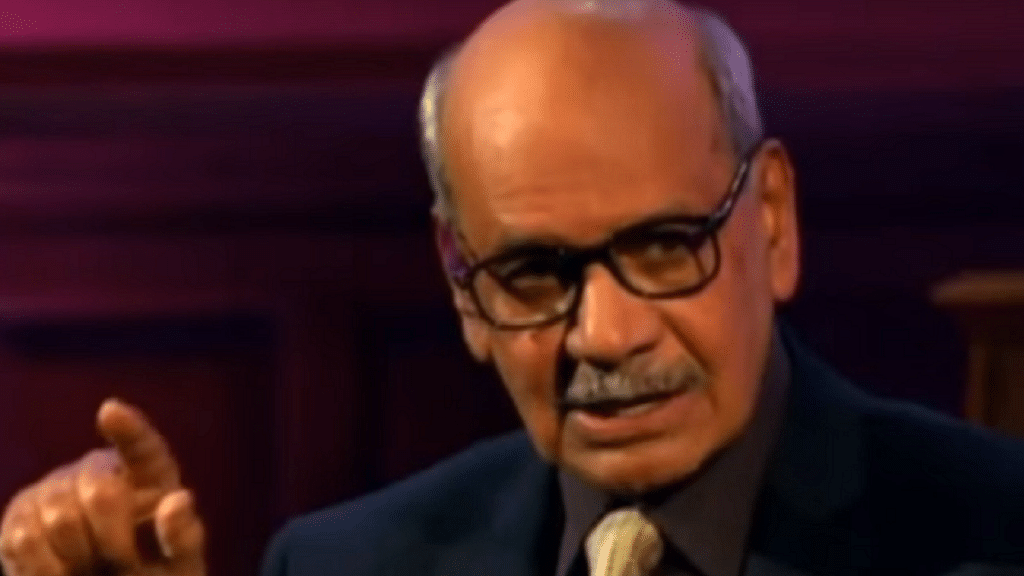Asad Durrani has been summoned to the Pakistani army headquarters Monday, as the book he co-authored with former Indian spy chief A.S. Dulat makes waves.
New Delhi: A book by two former spymasters from India and Pakistan is continuing to make waves, with the Pakistani army spokesperson Maj-Gen Asif Ghafoor tweeting Friday that the General Headquarters (GHQ) had summoned the Pakistani author, former intelligence chief Gen Asad Durrani, to explain his position.
Lt Gen Asad Durrani, Retired being called in GHQ on 28th May 18. Will be asked to explain his position on views attributed to him in book ‘Spy Chronicles’. Attribution taken as violation of Military Code of Conduct applicable on all serving and retired military personnel.
— DG ISPR (@OfficialDGISPR) May 25, 2018
Ghafoor is clear about what he wants, which is an explanation on why Durrani, who should have known better, has violated the military code of conduct applicable to both serving and retired personnel. There’s no such thing as peacetime jhappi-pappi — once a spy, always a spy.
The book, The Spy Chronicles : RAW, ISI and the Illusion of Peace, was launched earlier this week in New Delhi, amid a high-profile setting that included a former prime minister (Manmohan Singh), a former vice-president (Hamid Ansari), a former external affairs and finance minister (Yashwant Sinha), and a former RAW chief (K.M. Singh).
Now, none other than former Pakistani prime minister Nawaz Sharif is using the revelations in the book as a lifeline. Having been banned from politics for life by the Supreme Court, and having been severely castigated for an interview in Dawn newspaper recently (in which he said, “should we allow them (non-state actors) to cross the border and kill 150 people in Mumbai?”), Sharif has now asked for a National Security Council (NSC) meeting to discuss the book.
An NSC meeting, called in the wake of his Mumbai remarks, had been so rough on the former PM that a lesser man would have been felled by the body blow.
So what does the book say that is stirring the tea leaves in Pakistan?
1. Former RAW chief A.S. Dulat talks of how he and Durrani got a bottle of whiskey from Durrani’s car in Islamabad in 2011 — three years after the Mumbai attacks — and discussed the possible fallout of another attack. Durrani concedes here that “India had to retaliate” but that “it could be managed”.
“It was interesting,” says the former RAW chief. “Here was a former ISI chief with a considerable reputation, suggesting how to choreograph surgical strikes. How can a person get more candid?”
2. Durrani admits that the Pakistani position on Kulbhushan Jadhav, the former Indian naval officer accused of spying, was linked to the Indian position of connecting the 1 January, 2016, Pathankot attacks to the Pakistani military.
3. Durrani concedes that Nawaz Sharif didn’t have full knowledge of the Kargil operation but may have been part of one of two early meetings. He adds that the Musharraf-led operation was a disaster from the beginning, as it was always clear that Kargil “lay this side” of the Line of Control (within India).
4. Dulat admits that it was RAW that tipped off the ISI, which averted the terrorist attack against Pakistani army chief Pervez Musharraf soon after the 9/11 attacks.
5. Durrani talks about the conversations between former army chief Hamid Gul and then PM Narasimha Rao’s principal secretary A.N. Verma on the possibility of a solution to Kashmir. He adds that such conversations also took place between himself and former RAW chief G.S. Bajpai in 1991 as well as between former RAW chief C.D. Sahay and his spy counterpart, Ehsanul-Haq, after the 2003 ceasefire.
6. Durrani admits that Pakistan is not going and won’t go after the Haqqani terror network as that would be “suicidal” for the country.
7. Durrani admits that Pakistan’s handling of Balochistan has been faulty from the start. That, although the Pakistan state can control it through force, the state’s corruption is making this increasingly difficult.
8. Durrani states that the Agra summit failed because “all the eggs” were placed in former PM Atal Bihari Vajpayee’s basket, rather than L.K. Advani, then deputy PM, who had been instrumental in making the summit happen.
9. Durrani talks of how the Pakistanis collaborated with the US on “taking out” Osama bin Laden from his three-storey home in Abbottabad, located within shouting distance of the Kakul military academy. Durrani doesn’t name who “leaked” the information to the Americans, but he says he knows.
10. Durrani says he told Musharraf that he should not undertake a coup against Nawaz Sharif but handle it differently. “Even banana republics nowadays have a façade of democracy,” he says.
11. Musharraf is described by the Americans as “he’s a good guy, English-speaking, whiskey-drinking, we can do business with him”.
12. Durrani, right towards the end, blames the media. “Media is the enemy of peace. If there is peace, the media will lose their jobs. Channels will close down. Many who go yap-yap-yap and shout their heads off will not get a second look.”
